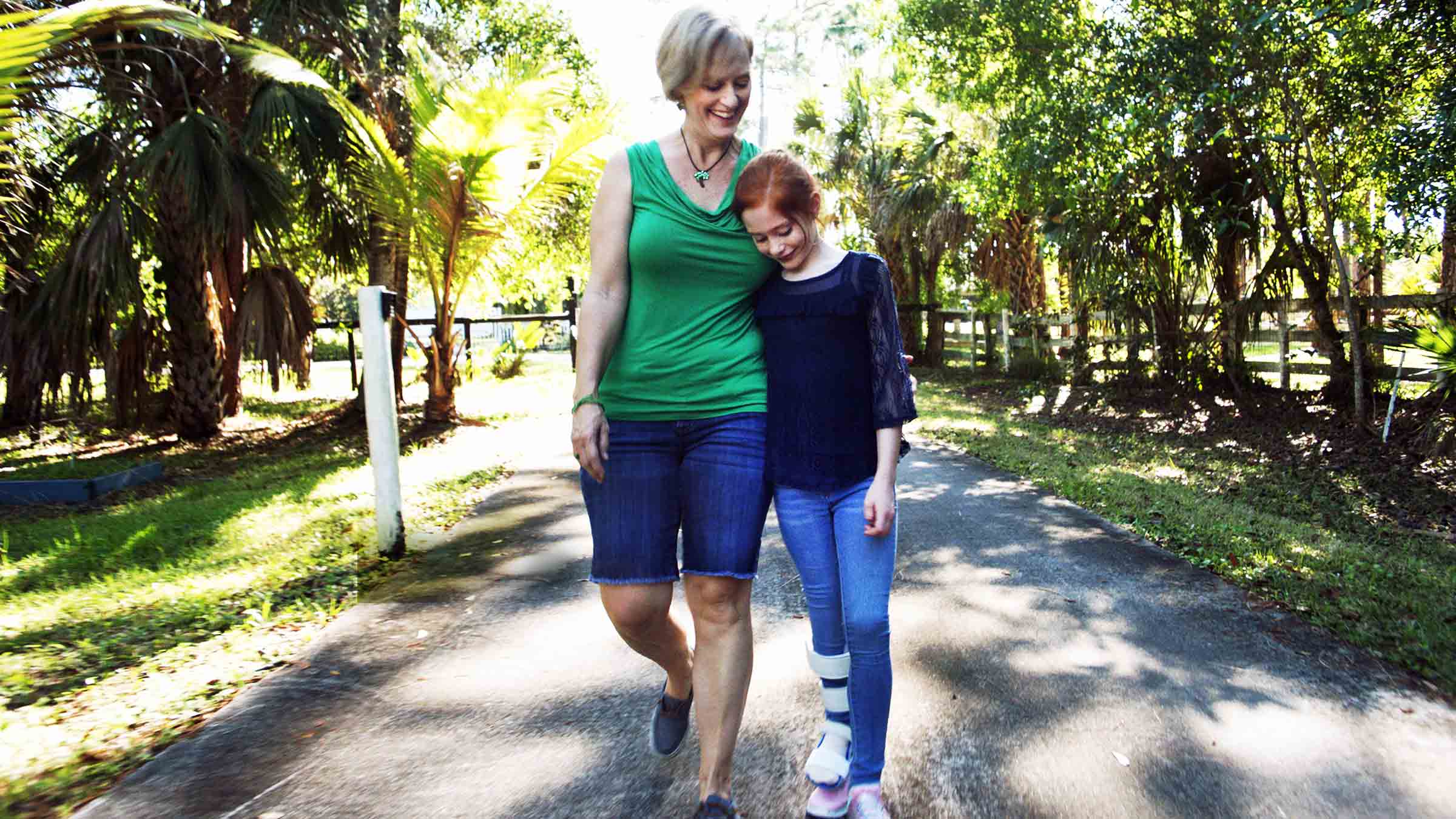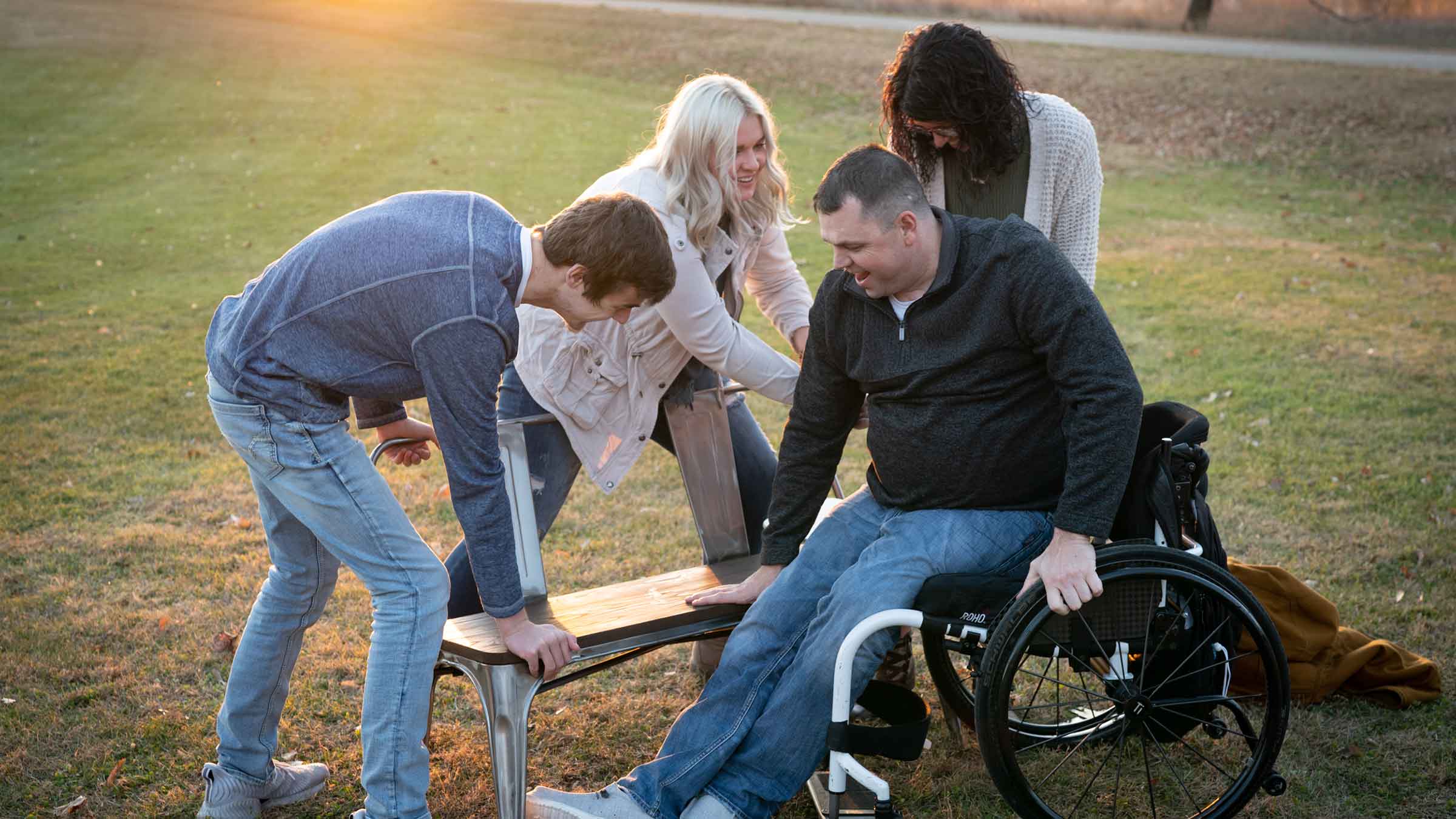10 Important Tips for Caregivers, from Caregivers

CaringBridge Staff | 10.17.19
Perhaps you are just beginning your journey as a caregiver, or maybe you’ve been in this role for a long time. Either way, caregiving is a huge responsibility that can be very rewarding, but it can take its toll.
We offer 10 tips for caregivers that can help put the “pep back in your step” and allow you to provide the best possible care to your loved one.
1. Learn to Communicate Effectively
Communication is key, both with your loved one and their medical team. If you’re caring for a loved one with a terminal illness (or even a disease like dementia), they will likely have a medical team or multiple doctors working with them. Learning to communicate with these doctors is essential as a caregiver. This will help you understand what you need to provide for your loved one, how you can aid in their care, and will allow you to advocate for them if need be.
As well as doctors, learning to communicate with your loved one is incredibly important too. Perhaps they’ve lost touch with their verbal skills, or just don’t have the right words to say. Maybe you now need to rely on gestures to communicate with them effectively. Just be patient with them, and realize that they’re doing their best – just like you are.
2. Take Care of YOU
Making time for self-care can be difficult, especially when it becomes your first instinct to put the person you are caring for above all.
This could mean actively checking in with yourself every day, making sure you see your doctor and reducing personal stress. Caregiving takes a toll on caregivers, but it’s important to make sure your mental and physical health are priorities – you won’t be able to care for your loved one if you’re not healthy.
“Give yourself permission to ask for a break. We need to take care of ourselves in order to take care of someone else. I enlisted the help of my family who were willing. Never force someone to be a caregiver, that only breeds resentment.”
Kim H.
“Ensure you take time to find joy in every day. Do something for yourself. Find a way to feed your mind, body and soul each day. Take a walk. Play music you enjoy. Keep people close to you that lift you up.”
Ashley C.
“Rest and feed your body! If you don’t take care of yourself, you can’t take care of your loved one. When people ask if they can help, let them. It’s ok to not do it all yourself. Your loved one would want you taking care of yourself.”
Beth H.G.
3. Acknowledge Your Loved One’s Limitations

Your loved one may struggle with activities that they used to find enjoyable or be able to do themselves. For example – they may no longer be able to dress themselves or use the bathroom. Perhaps they may need help with bathing. No matter the task, it’s important to understand these limitations and to still treat them as the person that they are – not as a patient.
Even if they are unaware of the ongoing tasks you complete for them or can only recognize you when you’re touching their hand, know that even with their limitations, they are still the person you love and cherish.
“Cherish the bodies you are caring for, even if the person you love is no longer aware of the world around them. They are still the bodies of the people you cherish and I believe, one day, they will thank you.”
Sandra L.
“The main thing is to listen to what they have to say. Words may be few at the end. Comfort by holding their hand. Sing softly as their hearing is the last to go. Never is there time to discuss anything but your love and concern for them. The touch is the most powerful.”
Tommie L.T.
4. Accept Help from Your Community, Family and Friends
When your friends, family or community offer support – don’t hesitate to accept it! Being a caregiver is a large, incredibly involved task, and sometimes it can feel like it’s a massive thing to tackle alone. A common worry for caregivers is that they feel as though they are a burden on others when they ask for help – but that’s actually the opposite of being true!
Tip: To help coordinate tasks like meal sign up, picking up meds, and more, The CaringBridge Planner is an all-inclusive scheduling tool to help you request and receive – support with everyday tasks. It’s all there, with a time and place for each task and space for anyone who wants to help.
“When people offer to help you, they are sincere and take them up on their offer. A caregiver needs time to get away for a few hours. When my Mama was on hospice care, the nurse told us that the person being cared for will choose who will be with them at the time of their passing so if you step out briefly and return after their passing, don’t feel guilty for not being there. It was meant to be.”
Christine G.S.
“Get as much outside help from your family, friends or church members in the daily aspect of being a caregiver. Be sure to give yourself self care.”
Michelle R.M.
“When you feel like you’re overwhelmed, have a friend or family member come sit with your loved one for an hour or two, we all need breaks from time to time.”
Candy S.
5. Be Realistic
It’s important, both as a new caregiver or an experienced one, to be realistic about what your loved one is experiencing – whether it be a memory condition, disease or the process of aging.
Allowing yourself to cope with feelings of sadness is essential – and don’t be afraid to consult a professional for help if you are in need of it.
6. Learn How to Provide Proper Physical Care

Being a caregiver is physically demanding – especially if your loved one struggles with mobility. Learning the proper way to lift, feed and provide other forms of care for your loved one is an important piece of the caregiving process. Knowing the correct way to do caring methods will help minimize the risk of injury.
Talk to your loved one’s doctor to learn more about how you can provide proper care.
7. Be Open to New Methods of Care
Sometimes it seems as though new methods of care pop up every day! Technology is a really great tool for aiding with the care of your loved one.
New programs, like online patient portals, are secure websites that give patients convenient, 24/7 access to personal health information from anywhere with an Internet connection. These portals can help anyone responsible for the care of your loved one stay up-to-date on medical information that is shared between doctor and patient.
Being open to new methods of care ensures that you are pursuing the right path of care for both you and your loved one – and that you’re both getting the support you need.
8. Stay Connected with the Outside World
When you become a caregiver, it’s easy for your new responsibilities to completely take over your world. When this happens, you can find yourself feeling isolated – which could lead to symptoms of depression becoming more prevalent in your life.
Don’t allow for this to happen – take some time to stay connected with the outside world – family, friends, colleagues – and talk about something other than your responsibilities as a caregiver. Remember, taking care of yourself is important for the care of your loved one, too.
And when you just don’t feel like seeing anyone, these caregiver quotes may provide some solace.
9. Get Organized
Consider all legal documents, financial obligations and care preferences, and make sure you’ve spoken to your loved one about them. It may seem like a difficult conversation to have at first – but you’ll thank yourself later.
It helps to have these things in order sooner than later, so that if the question of a will, affording a nursing home or whether or not to hire a full-time caregiver comes up, you’ll be able to have the information quickly without worrying about where to find it or how to access it.
10. Start a CaringBridge Site
Keeping your loved one’s family and friends involved and updated is a key priority through the caregiving process. A free CaringBridge online health journal allows you to update everyone at once and offers a scheduling tool to help you coordinate caring tasks.
Don’t go through your health journey alone.
You can stay connected to friends and family, plan and coordinate meals, and experience love from any distance.
All of this is ready for you when you start your personal CaringBridge site, which is completely free of charge, ad-free, private and secure. Don’t spend another minute alone!
What Tips Have Helped You?
Caregivers need help too, or they could be at risk for serious burnout. We hope these tips from the real experts – actual caregivers – have offered some comfort and helpful guidance.
What other tips do you have for caregivers that would be helpful to know? Please share your insight in the comments below.
I agree with Tammy. When reading the insipid suggestions for “taking care of yourself” I get angry and even more discouraged. The only way I can take care of myself is to abandon the person I am caring for.
I get so tired of hearing take care of yourself because when you are a middle class person that’s not a child or a senior there are no resources to help you do so. The worst thing you can say to an exhausted caregiver that has no family or resources to help is take care of yourself!